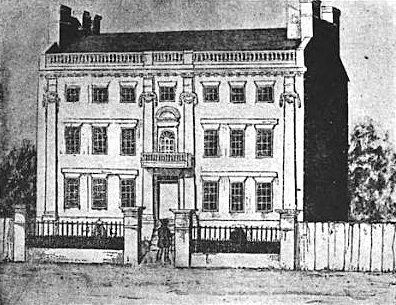Confrontation at Governor Hutchinson’s House
When we left the “Body of the Trade” in Faneuil Hall yesterday, Whig leader William Molineux had just threatened to storm out of the meeting and kill himself.
Molineux wanted to lead the body to Thomas Hutchinson’s mansion in the North End (shown here) and confront the lieutenant governor’s sons, Thomas, Jr., and Elisha, about their plan to leave the non-importation agreement.
Josiah Quincy, Jr., warned that marching on the acting governor’s house was tantamount to treason. Molineux’s radical colleagues disagreed, but the rich merchants and town officials—even John Hancock—were still reluctant. Or maybe they just disliked Molineux’s confrontational approach.
Molineux’s dramatic gesture was met by an equally dramatic response from the radical Dr. Thomas Young, according to a Crown report now in Harvard’s Houghton Library:
The crowd retired from that house but visited the other defiant importers: Jackson, Nathaniel Cary, Benjamin Greene, Theophilus Lillie, John Taylor, and the governor’s nephew Nathaniel Rogers. They “receiv’d no satisfactory answer from any one of them.” Most didn’t even open their doors. Lillie said that “he had nothing left but his Life, which he would deliver up if they pleas’d.”
Molineux and the “Body of the Trade” seemed to be stymied. According to the Crown informant:
TOMORROW: A private deal.
Molineux wanted to lead the body to Thomas Hutchinson’s mansion in the North End (shown here) and confront the lieutenant governor’s sons, Thomas, Jr., and Elisha, about their plan to leave the non-importation agreement.
Josiah Quincy, Jr., warned that marching on the acting governor’s house was tantamount to treason. Molineux’s radical colleagues disagreed, but the rich merchants and town officials—even John Hancock—were still reluctant. Or maybe they just disliked Molineux’s confrontational approach.
Molineux’s dramatic gesture was met by an equally dramatic response from the radical Dr. Thomas Young, according to a Crown report now in Harvard’s Houghton Library:
Dr. Young call’d out stop Mr. M[olineu]x stop Mr. M[olineu]x for the love of God stop Mr. M[olineu]x. Gentlemen, If Mr. M[olineu]x leaves us we are forever undone, this day is the last dawn of liberty we ever shall see.That group was still mostly politicians, not merchants, but they were all upper-class. And they weren’t going alone.
Mr. M[olineu]x was upon this prevail’d upon to return and the following Persons agreed to serve on their Committee vizt. Mr. M[olineu]x Deacon [William] Phillips, [James] Otis, S[amuel]. Adams and Saml Austin—
about 1/2 past 2 o’Clock the above persons attended by upwards of 1000 people of much the same stamp of those who waited upon [William] Jackson the day before, set out for the Lt. Govr’s house, when they came before the door the Lt. Govr. open’d one of his Windows and ask’d of them what they wanted;Which is of course the exact thing that Quincy had warned could happen. But Molineux wasn’t deterred.
M[olineu]x replied that it was not him but his Sons that they desired to see—
the Lt. Govr. addressing himself to the whole spoke to the following purport, Gent. do you know that I am the representative of the King of Great Britain the greatest monarch on earth, and in his name require you to desperse—
about this time his Sons came also to the window when M[olineu]x read to them the vote No. 1 and the demand which immediately follows it [as quoted yesterday]—That document could, of course, have been evidence in a trial.
the Sons answer’d that they had nothing to say to them—
the Lt. Govr. asked for a Copy of the vote but was told by M[olineu]x that he was intrusted with only the original and was not at liberty to give a copy.
The Lt. Govr. also observ’d to Otis that he was greatly surprised to see him there, who cou’d not be ignorant of the illegality of such proceedings, and further added that he had there in his Eye six or seven People who had been accessory to the pulling down of his house—That was back in August 1765 during the Stamp Act riots. Hutchinson, who was also a historian, never forgot.
The crowd retired from that house but visited the other defiant importers: Jackson, Nathaniel Cary, Benjamin Greene, Theophilus Lillie, John Taylor, and the governor’s nephew Nathaniel Rogers. They “receiv’d no satisfactory answer from any one of them.” Most didn’t even open their doors. Lillie said that “he had nothing left but his Life, which he would deliver up if they pleas’d.”
Molineux and the “Body of the Trade” seemed to be stymied. According to the Crown informant:
This Evening the friends of Government thought they had gain’d a compleat victory, and numbers of the most considerable Merchts. in the British trade who had hitherto been silent could not help publickly declaring that they now hoped they were releas’d from their bondage as they were convinced should the Hutchinsons, Jackson, and others mention’d before, stand out for a few days that great numbers would join themWas this the end of non-importation?
TOMORROW: A private deal.


No comments:
Post a Comment